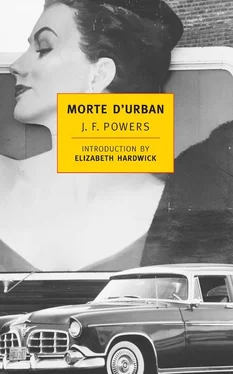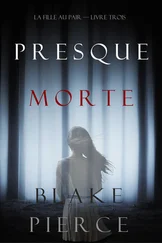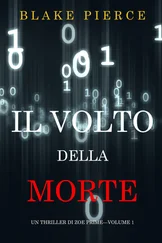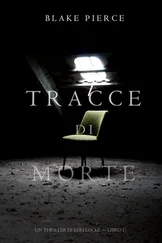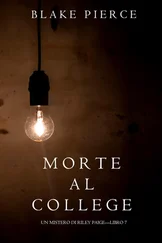“Know a man by the name of Zimmerman?” said Father Urban.
“Old man?”
“He could be seventy, if that’s old.”
“Goes to our church.”
“All right, but who is he? What’s he do?”
“Zim’s Beer.”
A few moments later, Father Urban lit a cigar. “Where’s Mirror Lake?”
“Why, he lives out there!” said the curate. “The man you were asking about!”
The usual thing was to put the brighter boys in cathedral parishes. Could this be the case in the Ostergothenburg diocese? “Who?” said Father Urban.
“Zimmerman! He used to live in town, but now he lives out there!”
“You don’t say,” said Father Urban.
The day was about right for his new straw hat with the fishnet band (from which he’d removed the feather and seashells). After he dropped the curate at the rectory — he’d driven the two blocks to Clara’s so the kid could say he’d ridden in a sports, or, as he called it, racing car — Father Urban pulled over in the shade of the Cathedral. He got out of the car, took off his coat, rabat, and collar, and put them on the other seat. Then he got in, started the motor, which had a plummy sound he loved, shifted himself into a slouch, and, with his head resting easily to one side as if he were dreaming, he — there was no other word for it — tooled toward the outskirts of town.
The little snub-nosed Barracuda was five months old, had wire wheels, leather upholstery, and so on, and it certainly made a man feel good to drive it. At a stoplight, though, when a girl in a white MG paused alongside him, a girl wearing sun-glasses and nothing else — so it appeared from where he was sitting — and with a crisp blue dog beside her, Father Urban experienced a heavy moment, a moment of regret and longing. He wished the little Barracuda were black or white instead of bright red, which just wasn’t right for him, and he wished he had a crisp blue dog beside him. So he put on his sunglasses. When he hit open country, he threw away his cigar and gave the little thoroughbred its head.
He noted a billboard with interest. “FRESH! ZIM’S BEER!” He wondered, though, who wanted fresh beer. Then he saw another billboard: “SEE MIRROR LAKE — SEE YOURSELF FISHING, BOATING, SWIMMING, HEATED CABINS.” Would he find Mr Zimmerman living in one of them ? ( Turn back! Turn back! ) Such a thought wouldn’t have occurred to Father Urban — even a small brewery could be a very worth-while affair — if he hadn’t formed such a poor impression of life in the Ostergothenburg diocese.
Some shirtless youths in an old car roared up from behind him. “Drag?” they shouted. Their old tub, lower by several inches in front, seemed to be running downhill. It was painted two shades of green to look like a watermelon, which it did, one of the striped variety, and on the front fender were the words “THE MELLON.” “Drag race?” Father Urban shook his head. “Chicken!” The Mellon shot ahead. Father Urban put it out of mind and, enjoying the feel, the roadability, of the little Barracuda, thought of Sylvia.
He was worried about her. After she’d brought the little car out to the Hill the day before, and after he’d driven her home before setting out for Ostergothenburg, she’d asked him to read from a book she happened to have with her, just one verse of a poem, and this Father Urban had been glad to do. When he finished, he said, “Yes.”
“Is that what you mean?”
“Yes, I suppose it is.”
And it was — the poet had put it very well:
An intellectual hatred is the worst,
So let her think opinions are accursed.
Have I not seen the loveliest woman born
Out of the mouth of Plenty’s horn,
Because of her opinionated mind
Barter that horn and every good
By quiet natures understood
For an old bellows full of angry wind?
Yes, and so had Father Urban. But Father Urban, with and without benefit of poetry, had been through this sort of thing with too many women — women with husbands like Ray Bean, all business, and women with husbands unlike Ray Bean, to say nothing of women without husbands — and he was afraid Sylvia might be building herself up for a letdown. Sylvia might not know what she had in mind. Or she might. In effect, by asking him to read the poem, she had put words in his mouth, words he might think but would never speak, words which might be said to compromise him, words from which, in the privacy of her imagination, Sylvia might distill pleasure of an illicit nature. And “loveliest woman born” was pushing it some in her case. “Damned attractive redhead” would’ve been more like it. Experience had shown Father Urban that a handsome priest couldn’t be too careful with women. Should he go on using Sylvia’s car? Considering that he’d be lost without it — many of his little trips would’ve been impossible without the car — he guessed he would. Maybe he’d use it less, though.
He found Mr Zimmerman living around on the other side, the “old” side, of the lake. Mr and Mrs Zimmerman were out in front of a five- or six-room cottage, sitting in tubular chairs under some lovely oaks, with the Sunday papers on the grass at their feet, and with the lake, which appeared to have a good sandy beach, just a chip shot away. There was a picnic table, and on it a Scotch-plaid jug and some colored aluminum tankards. Mrs Zimmerman filled and brought one of these to Father Urban.
“It’s called Icy-ade,” she said. Except for her hair, which was longer, and her dress, Mrs Zimmerman looked exactly like her husband. This was a phenomenon Father Urban had often observed in elderly couples, and could only attribute to their common diet. “You may have seen it advertised on television,” she said.
“Grape?” said Father Urban, after a taste, since the stuff was purple. “Good and cold.”
“That’s the main thing,” said Mr Zimmerman.
“Still there’s a lot to be said for a good glass of beer,” said Father Urban.
“Too gassy,” said Mr Zimmerman, getting up.
Father Urban followed him to the water’s edge and then out onto the dock to which a big plastic boat was tethered. Father Urban, if he owned a boat of that class, would want to see brass and mahogany. Mr Zimmerman’s boat looked like a bath toy. After admiring the boat, they considered the sad state of affairs in what Father Urban believed was called a live box. There were three small fish floating in it, and a few more that appeared to be dying, sipping at the surface of the water.
“Wolftangl, he better watch it,” Mr Zimmerman said, gazing out across the water. “I’ll shoot ’em on sight— any where in this lake.”
“How’s that?” said Father Urban.
“Joe Wolftangl, fella over on the next lake. Raises turtles for the market. One got in my box last month. Fish don’t have a chance.”
“You catch these fish, and you put ’em in here, and you eat ’em later — is that it?”
“My wife likes to eat ’em, but she don’t like to clean ’em.”
Mr Zimmerman gazed across the water again, and then he returned to land, Father Urban following, saying, “You’re not the Zim’s Beer Zimmerman, are you?”
“My son runs that now,” Mr Zimmerman said. “We had a skunk pass through here again the night before last. Good thing we don’t keep chickens.”
Why am I here? Father Urban asked himself. Turn back! Mrs Zimmerman was gone when they returned to the chairs. Father Urban was about to sit down — having decided to let his host play it his way — when Mr Zimmerman said, “Like to see my shack?”
Father Urban glanced up at the cottage. “O.K.,” he said.
They went up to the cottage, but then on into the woods behind it, until they came to a log cabin of recent construction. “My shack,” said Mr Zimmerman.
Читать дальше
